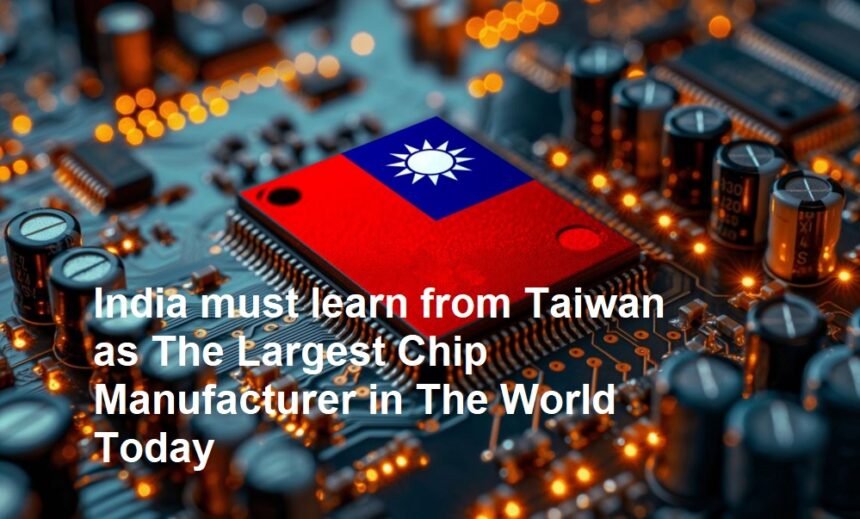India, as it strives to emerge as a global leader in semiconductor manufacturing, can look to Taiwan as a model of success in the chip production industry. Taiwan, particularly through its flagship company Taiwan Semiconductor Manufacturing Company (TSMC), has established itself as the largest and most advanced chip manufacturer in the world. As India makes efforts to strengthen its own semiconductor ecosystem, there are important lessons it can learn from Taiwan’s rise to dominance in this vital sector.
Taiwan’s journey to becoming the world’s semiconductor powerhouse is a tale of strategic planning, focused investment, and continuous innovation. Taiwan’s semiconductor industry began in the 1970s, and by the 1980s, the government recognized the strategic importance of the industry for the island’s economic future. With support from the Taiwanese government, Taiwan Semiconductor Manufacturing Company (TSMC) was founded in 1987, becoming a critical player in the global chip supply chain.
Today, TSMC is the undisputed leader in advanced semiconductor manufacturing, producing chips for major companies like Apple, Nvidia, Qualcomm, and others. TSMC’s dominance is built on its ability to develop cutting-edge technologies, such as 7nm, 5nm, and even 3nm process nodes, which are the heart of modern computing devices, from smartphones to artificial intelligence (AI) processors.
Taiwan’s success is not merely a result of technological innovation; it is also due to the country’s consistent investment in its semiconductor ecosystem, including research and development (R&D), infrastructure, and education. Taiwan’s highly skilled workforce, developed through government-supported educational initiatives, has been a critical factor in its growth as a global semiconductor leader.
India, with its growing economy and ambitions to become a global technology hub, is focusing on semiconductor manufacturing as part of its broader strategy to reduce reliance on imported chips and boost domestic production. However, India faces a number of challenges in replicating Taiwan’s success. To achieve its goal of becoming a semiconductor manufacturing giant, India can learn from Taiwan’s approach in several key areas:
- Government Support and Policy Framework
One of the most significant factors behind Taiwan’s semiconductor success is the government’s role in nurturing the industry. Taiwan has consistently provided incentives, subsidies, and favorable policies that have encouraged investment in semiconductor manufacturing. The Taiwanese government not only supported companies like TSMC but also established world-class R&D facilities and educational institutions to ensure a steady pipeline of skilled workers. India must establish a similar long-term vision and policy framework to encourage both domestic and foreign investments in semiconductor manufacturing.
India has already begun taking steps in this direction with its “Semiconductor Mission,” a government initiative aimed at establishing a comprehensive semiconductor ecosystem. The Indian government must continue to provide financial incentives, tax breaks, and support for R&D, while also ensuring that policies are stable and predictable, offering manufacturers a long-term outlook.
- Building a Strong Talent Pool
Taiwan’s semiconductor industry has flourished because of its highly skilled workforce. The country has invested heavily in educational initiatives focused on science, technology, engineering, and mathematics (STEM) fields, ensuring a constant supply of talented engineers and technicians. India, with its large and growing young population, has an advantage in this area. However, India needs to develop and strengthen its educational infrastructure, focusing specifically on semiconductor engineering, advanced manufacturing techniques, and the latest chip fabrication technologies. Encouraging partnerships between academia, research institutions, and the private sector will also be crucial in creating a world-class talent pool. - Fostering R&D and Technological Innovation
Innovation and research have been key drivers of Taiwan’s semiconductor dominance. Companies like TSMC invest heavily in R&D to stay ahead of the technological curve. Taiwan has a robust ecosystem of universities, research institutes, and industry collaborations that promote cutting-edge innovations in chip design and manufacturing processes. India, too, must foster a similar culture of innovation by ramping up investment in R&D and ensuring that both the private sector and government agencies collaborate on semiconductor-related research.
Additionally, India should focus on developing expertise in advanced manufacturing techniques such as photolithography and etching, which are crucial to producing cutting-edge chips. Establishing state-of-the-art research centers and fostering public-private partnerships could be key to advancing India’s capabilities in chip design and production.
- Infrastructure and Supply Chain Development
Taiwan’s semiconductor industry thrives not only due to its technological expertise but also because of its advanced infrastructure. From efficient transport networks to reliable energy sources, Taiwan has created an environment that supports semiconductor manufacturing at scale. India must ensure that it builds the necessary infrastructure, including reliable electricity, water supply, transportation networks, and logistics systems, to facilitate large-scale chip production.
Additionally, developing a robust semiconductor supply chain is crucial. Taiwan has developed a highly integrated supply chain that includes raw materials, chip design, manufacturing, and testing facilities. India must invest in establishing similar supply chains to ensure that its semiconductor industry operates efficiently and is less reliant on imports of critical materials like silicon wafers and rare earth elements.
- Global Collaboration
Taiwan’s success in the semiconductor industry is also due to its willingness to collaborate with global companies. TSMC, for instance, has built strong relationships with major tech companies worldwide, helping it remain at the forefront of the industry. India can learn from this approach by fostering stronger relationships with global players in the semiconductor industry, such as Intel, AMD, and Nvidia, as well as investing in partnerships with other countries that have advanced semiconductor industries, like the U.S., Japan, and South Korea.
India’s ambition to become a global leader in semiconductor manufacturing is a worthy goal, and Taiwan offers a valuable blueprint for success. By learning from Taiwan’s government support, talent development, R&D investments, infrastructure development, and global partnerships, India can build a strong and competitive semiconductor industry. However, it will take time, substantial investment, and collaboration between the public and private sectors to replicate Taiwan’s remarkable success. With the right policies and strategic focus, India could soon emerge as a major player in the global semiconductor market, reducing its dependence on imports and contributing to the growth of the global tech ecosystem.











